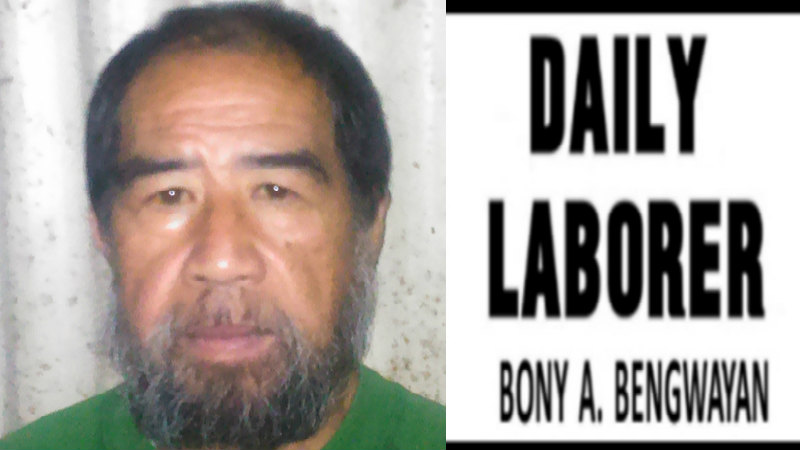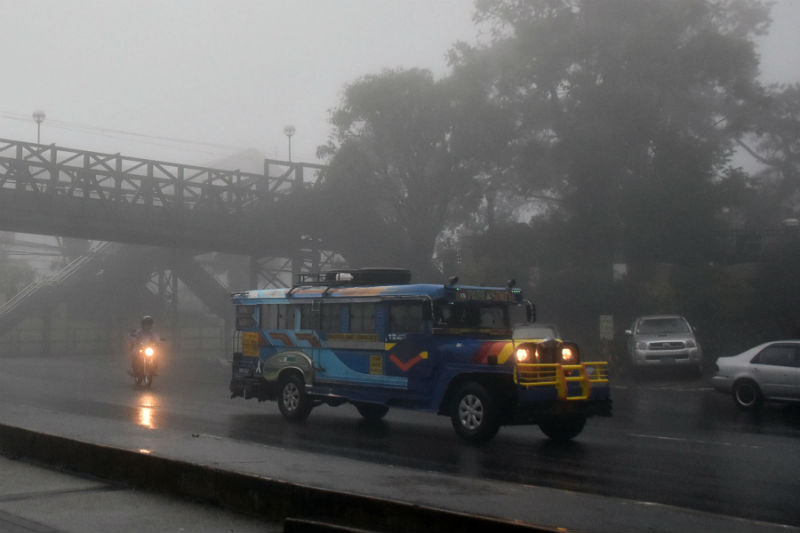First, before proceeding to our topic, “Kinasayaat,” Herald Express takes this opportunity to compliment a police officer of the Baguio City Police Office (BCPO) whose one simple act he did on a Saturday gained him appreciation from Baguio residents as well those elsewhere in Cordillera who learned of the officer’s act.
While in performance of duty, SPO4 Wenceslao Bangawan, assigned with BCPO Station 5 was spotted giving bread and water to a senior male person apparently hungry and sitting alone in one of the seats somewhere at Burnham Park.
Such simple gesture – but one simple giant effort – had shown SPO4 Bangawan possesses character, the substance which defines the care and the growth in formation of habits, which years have picked up and combined.
Bangawan’s simple act to an aged fellow teaches us that if we wish milk of human kindness thickened into cream of goodness, or cream of goodness molded into butter of bliss, all we have to do, is do good.
SPO4 Wenceslao Bangawan, Sir, new friends you gained among kin of the aged person you helped, as well as other friends in Cordillera Administrative Region (CAR).
Secondly, Ah Kong takes this opportunity to personally express his family and relatives’ profound gratitude to the thousands who readily responded to the call “Dinner for A Cause,” for Bridger Likigan Bengwayan, diagnosed with chronic kidney disease, and slated for kidney transplant at the National Kidney Institute (NKI), Manila.
For the thousands who responded: UNAY, UNAY NGA IYAMAN MI, APOH!
Many knew they couldn’t attend the dinner, held November 9, 2018 at the Cathedral of the Resurrection Hall, Magsaysay, Baguio City; they still bought tickets.
Highlanders and lowlanders alike, they responded, from the provinces, from government and private sectors, from all walks of life, in the likes of students, nurses, doctors, teachers, lawyers, engineers, mothers, fathers, Lolos, Lolas, children, youth, out-of-school youth, relatives, authorities, those in politics, those in business, strangers, foes, friends – all daily laborers.
They responded – not really for the dinner – for an overriding goal: pull from the brink of an abyss a young person starting out in life.
Bridger is the fourth son of spouses Ah and Aida. The couple have five strapping boys. Their first, Bismarck, will give one of his kidneys to his brother, Bridger, an expensive transplant operation.
Indeed, to all and sundry, there was more sunshine in your one concerted act of kindness which we hold dear in our bosoms.
So, back to kasayaatan.
“Nagsayaat metten,” Luis Labagey, 56, from La Trinidad, Benguet happily gurgled in his throat last two Saturdays ago as he and this calloused worker reviewed photo of SPO4 Melecio Bangawan as he handed over food and drink he purchased for that lonely senior citizen at Burnham Park.
Labagey’s friend, this worker, cleared his unclearable throat but said nothing, trying hard to peer into the photo of a Baguio City Police Office (BCPO) member reaching out towards a member of the citizenry they are sworn “To Serve and Protect.”
Mebbeso, merry reader, you’re one among those who likely doesn’t easily get sentimental, like this darned and calloused old timer.
But once in a while, looking around and noticing “kinasayaat,” you hang your head like Tom Dooley in the famous song and cry that kinasayaat is, indeed, a flower that rears its beautiful head, expands, blooms and casts its nectarous odor on the feeling heart.
That even when the darkness of distress crops up, and its cold, withering dews fall upon us like oppressive load, kinasayaat rises like a budding plant to spring into new existence, its fragrance and beauty lending charm to anyone.
If you don’t have belief in this, ask SPO4 Bangawan – how it simply feels good by doing good.
Or ask Edgar Nabus, long-time employee of Benguet State University (BSU). Edgar simply feels good by, instead of making anybody uncomfortable, instead makes it a point to put that anybody feeling at ease, aside from extending a helping hand.
Edgar hold the view of rendering human existence ‘nasaysayaat” or sweeter by blending feelings, confiding interchange of sentiment and reposing upon the feeling of anyone.
There was that one time Edgar and this bearded hobo-worker sat talking at BSU campus.
Edgar (big in physique) related of one time when somebody said to him, “Nag-bassit ka a tao!” Instead of taking offense, Edgar, who can turn sour talk into laughable matter, looked the guy over and in a nasayaat way, laughingly answered,” Ay-ay, agsalamat ka ta bassit ak nga tao. Ta nu awan bassit nga tao, awan met ti dakkel nga tao.”
Edgar finds it that nu nasayaat ka ti padam, any distressed person can find a home in the bosom of a friend.
In a way, Nabus was trying to impart to this addle-brained trabahador that kinasayaat has a generous and soothing capacity, that spirals about the heart and apt to diminish selfish desires and open doors to nobler impulses rather than bad.
Yep, indeed, bad impulses like, “ti lalaki, ayaten, saan nga pagsangiten; este, ti babae, ayaten, saan pagsangiten.”
With such sentiment of Edgar, this peon of low I.Q. can’t understand why there are those who can’t see behind the kinasayaat of the anti-profanity ordinance passed by the City Council regulating and or stopping altogether cursing in places frequented by students.
Such fellows against the ordinance profess it smacks upon freedom of expression.
But definitely not Melindo Obac, from Baguio City, when his wife said to him, “ “Bawal na daw ang cursing sa Baguio.”
Melindo answered his wifey: “Wen isu nga ag-lotion ka a kanayon tapno saan a cursing ta kudil mo.”
Kinasayaat retains exhilarating charm that can even warmly cherish friendship between family relation, as these two, Kaismo and Rufino from region 1 found out, during a drinking session.
Kaismo (Drunk): “Pare, inar-arem ko idi ni nanang mo.”
Rufino: (Tahimik lang)
Kaismo: Deng-denggen nak pare, inar-arem ko idi ni nanang mo!”
Rufino: “Kuston dayta sarsaritaem, Daddy, ta nabartek kan.”
Sometimes, kinasayaat can be tested to its limits that youth, in their proper season of cultivating it forget its benevolent and humane affections.
Ever heard of innocently kinasayaat? Nope? Well, it’s often used by the youth to dupe their parents of their hard-earned money. Happened to this laborer long time ago in his youth and wrote to his father saying:
Dear Amang: “Mangipao-it ka man bassit iti kwarta ta adda igatang ko iti baddok. Ngamin, dagiti baddok ket kinagat-kagat dagiti bao (rats). Abot-abot dan.”
Answered the knowing father: “Dear Anak ko. Awan ti nairana a pirak mi ita, barok. Ngem di bale, ipaw-it mi laengen daytoy pusa tayo. Tutal nag-anak metten ket adda mabati ditoy balay tayo. Ni Amang mo.
There was also that time this trabahador – in his youth and new to the city – entered a restaurant and ordered.
Idi nalpas a nangan indawat din waiter din bill na ay: Rice: 20; pork chop: 150; chopsuey, 150, Total: 100.
Kanan baw din naay ay kailyan yo ay inocente: “Apay cino nan Total ay nay. Kaanen u na, egay ak nan order c Total. Nangina pay met.”
Innocently kinasayaat can sometimes unmask somebody. It happened during elementary when his teacher asked, “Bony, Who’s your hero?” Answered this addle-brained student: “My father.”
“Why do you consider your father hero”? He answered, “Because he isn’t afraid of anything.”
“Is there somebody your hero is frightened of?” his teacher asked. This boy innocently revealed, “Yes, my mother.”
It’s of high importance then, according to Fernan Dumipis, 62, from La Trinidad, that youth betimes acquire the temper and manners which render connections to kinasayaat comfortable.
For in good ‘ol Cordillera, kinasayaat among best of friends who chance to meet each other don’t often say “hello” to each other. Instead, they say, “Nya ngay!” And that’s the most wonderful kinasayaat greeting you get from an old friend.















